-
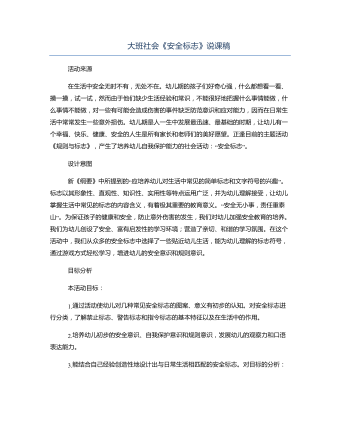
大班社会《安全标志》说课稿
在生活中安全无时不有,无处不在。幼儿期的孩子们好奇心强,什么都想看一看、摸一摸,试一试,然而由于他们缺少生活经验和常识,不能很好地把握什么事情能做,什么事情不能做,对一些有可能会造成伤害的事件缺乏防范意识和应对能力,因而在日常生活中常常发生一些意外损伤。幼儿期是人一生中发展最迅速、最基础的时期,让幼儿有一个幸福、快乐、健康、安全的人生是所有家长和老师们的美好愿望。正逢目前的主题活动《规则与标志》,产生了培养幼儿自我保护能力的社会活动:“安全标志”。新《纲要》中所提到的“应培养幼儿对生活中常见的简单标志和文字符号的兴趣”。标志以其形象性、直观性、知识性、实用性等特点运用广泛,并为幼儿理解接受,让幼儿掌握生活中常见的标志的内容含义,有着极其重要的教育意义。“安全无小事,责任重泰山”。为保证孩子的健康和安全,防止意外伤害的发生,我们对幼儿加强安全教育的培养。我们为幼儿创设了安全、富有启发性的学习环境;营造了亲切、和谐的学习氛围。在这个活动中,我们从众多的安全标志中选择了一些贴近幼儿生活,能为幼儿理解的标志符号,通过游戏方式轻松学习,增进幼儿的安全意识和规则意识。
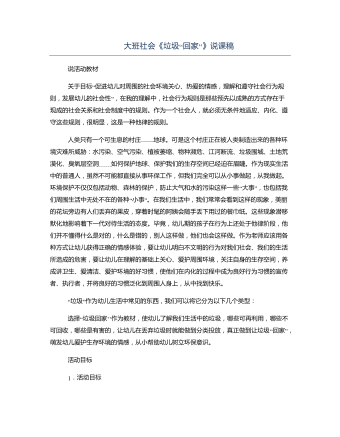
大班社会《垃圾“回家”》说课稿
人类只有一个可生息的村庄——地球。可是这个村庄正在被人类制造出来的各种环境灾难所威胁:水污染、空气污染、植被萎缩、物种濒危、江河断流、垃圾围城、土地荒漠化、臭氧层空洞……如何保护地球、保护我们的生存空间已经迫在眉睫。作为现实生活中的普通人,虽然不可能都直接从事环保工作,但我们完全可以从小事做起,从我做起。环境保护不仅仅包括动物、森林的保护,防止大气和水的污染这样一些“大事”,也包括我们周围生活中无处不在的各种“小事”。在我们生活中,我们常常会看到这样的现象,美丽的花坛旁边有人们丢弃的果皮,穿着时髦的阿姨会随手丢下用过的餐巾纸。这些现象潜移默化地影响着下一代对待生活的态度。毕竟,幼儿期的孩子在行为上还处于他律阶段,他们并不懂得什么是对的,什么是错的,别人这样做,他们也会这样做。作为老师应该用各种方式让幼儿获得正确的情感体验,要让幼儿明白不文明的行为对我们社会、我们的生活所造成的危害,要让幼儿在理解的基础上关心、爱护周围环境,关注自身的生存空间,养成讲卫生、爱清洁、爱护环境的好习惯,使他们在内化的过程中成为良好行为习惯的宣传者、执行者,并将良好的习惯泛化到周围人身上,从中找到快乐。
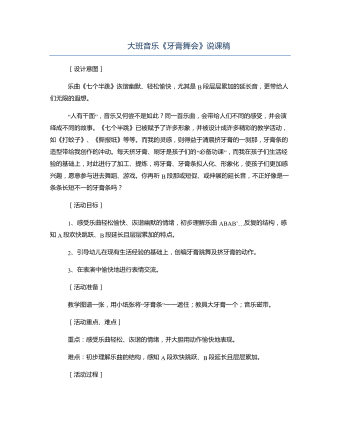
大班音乐《牙膏舞会》说课稿
[活动目标]1、感受乐曲轻松愉快、诙谐幽默的情绪,初步理解乐曲ABAB’…反复的结构,感知A段欢快跳跃、B段延长且层层累加的特点。2、引导幼儿在现有生活经验的基础上,创编牙膏跳舞及挤牙膏的动作。3、在表演中愉快地进行表情交流。[活动准备]教学图谱一张,用小纸张将“牙膏条”一一遮住;教具大牙膏一个;音乐磁带。[活动重点、难点]重点:感受乐曲轻松、诙谐的情绪,并大胆用动作愉快地表现。难点:初步理解乐曲的结构,感知A段欢快跳跃、B段延长且层层累加。
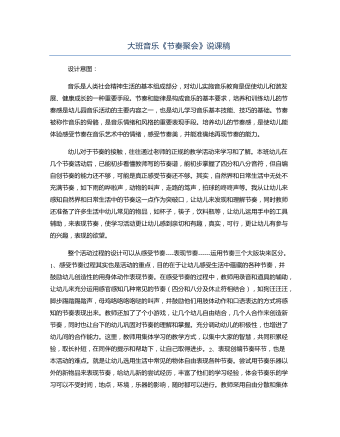
大班音乐《节奏聚会》说课稿
幼儿对于节奏的接触,往往通过老师的正规的教学活动来学习和了解。本班幼儿在几个节奏活动后,已能初步看懂教师写的节奏谱,能初步掌握了四分和八分音符,但自编自创节奏的能力还不够,可能是真正感受节奏还不够。其实,自然界和日常生活中无处不充满节奏,如下雨的哗啦声,动物的叫声,走路的笃声,拍球的咚咚声等。我从让幼儿来感知自然界和日常生活中的节奏这一点作为突破口,让幼儿来发现和理解节奏,同时教师还准备了许多生活中幼儿常见的物品,如杯子,筷子,饮料瓶等,让幼儿运用手中的工具辅助,来表现节奏,使学习活动更让幼儿感到亲切和有趣,真实,可行,更让幼儿有参与的兴趣,表现的欲望。整个活动过程的设计可以从感受节奏----表现节奏------运用节奏三个大版块来区分。1、感受节奏过程其实也是活动的重点,目的在于让幼儿感受生活中蕴藏的各种节奏,并鼓励幼儿创造性的用身体动作表现节奏。在感受节奏的过程中,教师用录音和道具的辅助,让幼儿来充分运用感官感知几种常见的节奏(四分和八分及休止符相结合),如狗汪汪汪,脚步踢踏踢踏声,母鸡咯咯咯咯哒的叫声,并鼓励他们用肢体动作和口语表达的方式将感知的节奏表现出来。教师还加了了个小游戏,让几个幼儿自由结合,几个人合作来创造新节奏,同时也让台下的幼儿巩固对节奏的理解和掌握。充分调动幼儿的积极性,也增进了幼儿间的合作能力。这里,教师用集体学习的教学方式,以集中大家的智慧,共同积累经验,取长补短,在同伴的提示和帮助下,让自己取得进步。
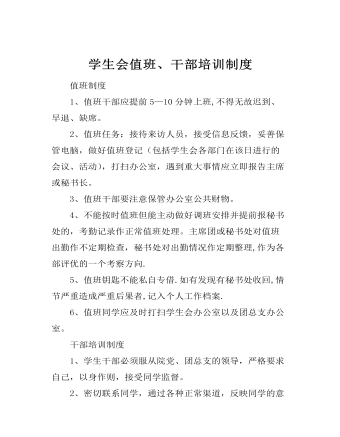
学生会值班、干部培训制度
2、值班任务:接待来访人员,接受信息反馈,妥善保管电脑,做好值班登记(包括学生会各部门在该日进行的会议、活动),打扫办公室,遇到重大事情应立即报告主席或秘书长。 3、值班干部要注意保管办公室公共财物。 4、不能按时值班但能主动做好调班安排并提前报秘书处的,考勤记录作正常值班处理。主席团或秘书处对值班出勤作不定期检查,秘书处对出勤情况作定期整理,作为各部评优的一个考察方向.
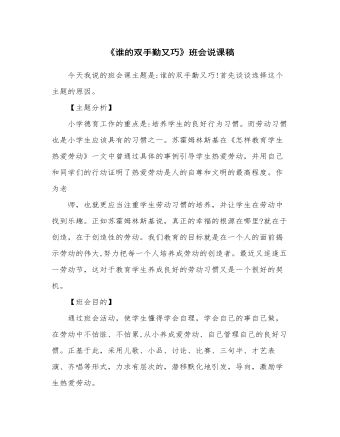
《谁的双手勤又巧》班会说课稿
小学德育工作的重点是:培养学生的良好行为习惯。而劳动习惯也是小学生应该具有的习惯之一。苏霍姆林斯基在《怎样教育学生热爱劳动》一文中曾通过具体的事例引导学生热爱劳动,并用自己和同学们的行动证明了热爱劳动是人的自尊和文明的最高程度。作为老师,也就更应当注重学生劳动习惯的培养,并让学生在劳动中找到乐趣。正如苏霍姆林斯基说,真正的幸福的根源在哪里?就在于创造,在于创造性的劳动。我们教育的目标就是在一个人的面前揭示劳动的伟大,努力把每一个人培养成劳动的创造者。最近又适逢五一劳动节,这对于教育学生养成良好的劳动习惯又是一个很好的契机。【班会目的】通过班会活动,使学生懂得学会自理,学会自己的事自己做,在劳动中不怕脏、不怕累,从小养成爱劳动、自己管理自己的良好习惯。正基于此,采用儿歌、小品、讨论、比赛、三句半、才艺表演、齐唱等形式,力求有层次的,潜移默化地引发,导向,激励学生热爱劳动。
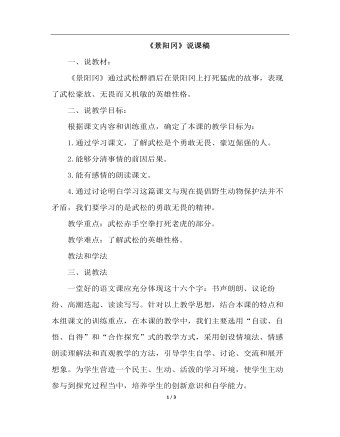
景阳冈(说课稿)
二、说教学目标:根据课文内容和训练重点,确定了本课的教学目标为:1.通过学习课文,了解武松是个勇敢无畏、豪迈倔强的人。2.能够分清事情的前因后果。3.能有感情的朗读课文。4.通过讨论明白学习这篇课文与现在提倡野生动物保护法并不矛盾,我们要学习的是武松的勇敢无畏的精神。教学重点:武松赤手空拳打死老虎的部分。教学难点:了解武松的英雄性格。教法和学法三、说教法一堂好的语文课应充分体现这十六个字:书声朗朗、议论纷纷、高潮迭起、读读写写。针对以上教学思想,结合本课的特点和本组课文的训练重点,在本课的教学中,我们主要选用“自读、自悟、自得”和“合作探究”式的教学方式,采用创设情境法、情感朗读理解法和直观教学的方法,引导学生自学、讨论、交流和展开想象。为学生营造一个民主、生动、活泼的学习环境,使学生主动参与到探究过程当中,培养学生的创新意识和自学能力。
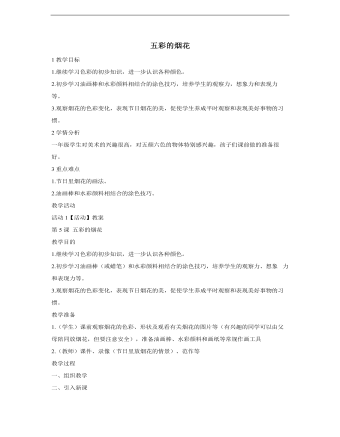
小学美术人教版一年级上册《第5课五彩的烟花》教学设计模板说课稿
2学情分析一年级学生对美术的兴趣很高,对五颜六色的物体特别感兴趣,孩子们课前做的准备很好。3重点难点1.节日里烟花的画法。2.油画棒和水彩颜料相结合的涂色技巧。教学活动活动1【活动】教案第5课五彩的烟花

新人教版高中英语必修3Unit 5 The Value of Money- Discovering Useful Structure教学设计
Step 3 Meaning1. 过去将来时表示从过去某一时间来看将要发生的动作或存在的状态, 常用在宾语从句中。一般由“would/should +动词原形”构成。She hoped that they would meet again someday. 她希望将来有一天他们能再见面。2. was/were going to+动词原形: 表示过去将要发生或很有可能发生的动作, 常用于口语中, 表示预言、意图或者打算等。He was going to start work the following week. 他打算下星期开始工作。3. was/were about to do: 常用来表示即将发生的动作, “刚要/正要做……”。注意该结构不与任何时间状语连用。I felt that something terrible was about to happen. 我感到某种可怕的事情即将发生。4.was/were to do: 表示“曾计划做某事”, 如果表示“本来计划做某事, 动作没实现”, 则需用 “was/were to have done”。She said she was to have told me about the accident. 她说她本来想告诉我关于事故的事。5.Start, go, come, leave, see, meet等动词的过去进行时: 表示就过去某一时刻而言即将发生的动作。She was coming later. 她随后就来。I had just put on my overcoat and was leaving to visit a friend of mine. 我刚穿上外套要去看我的一个朋友。

新人教版高中英语必修3Unit 5 The Value of Money-Listening &Speaking&Talking教学设计
4. A:We’d like to have someone to say a word at the beginning to welcome the group.B:↙Who?A:We thought that you or Dr.Johnson might do it.B用降调说Who,其意思是问,对方想让谁在开场时致欢迎词。Step 6 Pronunciation---Practice1. Listen to the short conversation and mark the intonation with ↗, ↙ or ↙, ↗. Then discuss with a partner what they intend to convey by using different intonation.Owner: You know what ?↗ It’s a million-pound bank note↙.Waiter 1: Really ?↗(question)Waiter 2: Really !↙(unbelievable and surprised)Waiter 3: Really ?!↙↗(first question then surprised)2. Listen to the conversations. Underline the parts that are stressed and mark the intonation. Then talk about the implied meanings of the responses with different intonations. Listen again and repeat.1) Henry: It’s a nice suit.Owner: Oh, it’s perfect!↙(The intonation means it is very suitable for Henry.)2) Henry: Well, that’s very kind of you.Owner: Kind, sir ?↗(what you said is not right) No, it’s kind of you. You must come whenever you want and have whatever you like. Just having you sit here is a great honour !!↙(welcome you to come again)3)Henry:Well, to be honest, I have none. Oliver:(happily) What luck!(excited) Brother↗, what luck!↙(It means “Didn’t you hear it?”)Henry: Well, it may seem lucky to you but not to me!↗(angry) If this is your idea of some kind of joke, I don’t think it’s very funny. Now if you’ll excuse me, I ought to be on my way.↙(If so, I would leave.)Roderick: Please don’t go↙...(hope Henry can wait for a moment)Part B Viewing and Talking---Describe people’s changing attitudes in a film clipStep 1 Before-listening---Tell the filmYou are going to watch part of the film The Million Pound Bank Note. Look at these photos and guess what happens in the film.

新人教版高中英语必修3Unit 5 The Value of Money-Listening &Speaking教学设计
Step 4: Listen again and decide if the following statements are true (T) or false (F).1 It was the first time Chen Liyan's story was reported. T口 F口2 Chen found 10,000 yuan in a small plastic bag in Taiyuan railway station口 F口3 Wang Zheng apologized to Chen because he couldn't offer her more money. T口 F口4 Chen took out a large loan to cure her daughter, T口 F口5 Wang set up a fundraising website for Chen's daughter after Chen told him about her situation. T口 F口Step 5:After listening, discuss the questions.1 What kind of person do you think Chen Liyan is?Chen Liyan is generous and honest because she returned a large sum of money to the owner.2 Did Chen return the money because she didn't need it?No. She returned the money because it was the right thing to do. Evidence for this is that she refused to accept the reward money because she felt that it had not been earned. 3 Is it common for people to do what Chen did?It depends on the culture. In some countries it is quite common to return money that has been found. In other countries, people believe "Finders are keepers!" 4 How did Wang Zheng feel about the return of his money?He must have been very happy and relieved to have gotten his money back. We know this because he thanked Chen repeatedly and even offered her a reward.5 Why did Ma Dongbao tell Wang about Chen's family?He must have had great sympathy for Chen and her daughter and wanted to help them.'We know this because he arranged help for them. 6 How did the news reporter feel about Chen's actions?The news reporter felt that it showed that money wasn't the most important thing in life. We know this because the reporter told us that this is what Chen believes. and then said, “that's a great attitude to take."

新人教版高中英语必修3Unit 5 The value of money-Reading and Thinking教学设计二
? Could you offer me some kind of work here?? I don’t want your charity, I just want an honest job.? Careless: I landed in Britain by accident.Step 7:Consolidation.? Find Henry? Roderick and Oliver were I .making a bet when they saw Henry, a poor young man. ? Know Henry? About a month ago, Henry was sailing and later he found himself carried out to sea by a strong wind. Fortunately, he 2.was spotted by a ship. And it was the ship that brought him to 3.England? Offer money to Henry ? Oliver and Roderick gave Henry a letter and told him that there was money in it. They 4.persuaded him to accept it, and made him 5.promise that it wouldn't be opened until 2 o'clock.Step 8:Language pointsa large amount of: a large quantity of; a great deal ofe.g. They bought a large amount of furniture before they moved their new house.make a bet: make an arrangement to risk money, etc. on an event of which the result is doubtful.e.g. We made a bet on the result of the match.permit sb to do something: allow somebody to do somethinge.g. My mother doesn’t permit me to ride in the street after it rained.by accident: as a result of chancee.g. I only found it by accident.stare at: look at somebody or something with the eyes wide open in a fixed gaze( in astonishment, wonder, fear, etc)to be honest: to tell you the truth; to be franke.g. To be honest, I don’t think we have a chance of winning.Step7 Homework:What do you think will happen to Henry? Will the bank-note help him or get him into trouble?

新人教版高中英语必修3Unit 5 The Value of Money-Reading and Thinking教学设计一
Everybody wants to get wealth.In today’s material world,making money or becoming wealthy symbolizes a person’s success and capability. Many people just make every effort, pay any price to attain greater wealth. With money,they can buy nice, large apartments in nice neighborhood. With money they can own luxurious cars. Wealth seems to bring all happiness in life.But is wealth the only road to happiness? Not really. There are many things in the world, which are beyond the means of money, such as friendship, love, health and knowledge. People are so preoccupied with struggling for money that they have no time or would not take the time to form or maintain friendship. What happiness can they feel living as lonely miserable creatures without love or friends in the world even if they accumulate tremendous wealth?In my opinion, people can’t do anything without money, but money is not everything. What money will bring you depends on your personal belief and goal in life. If you are kind enough to help others, especially the poor, money is a good thing to you. With it, you can do much more for the benefit of people and your country, and it will add to your own happiness. If you want money just for your own needs, you’ll never be satisfied or happy. In a word,you should have money spent for more people. Only then can money be the source of your happiness.Step 8 Homework4 students in a group, one acts Roderick, one Oliver, one servant and the fourth one acts Henry Adams, then listen to the tape, pay more attention to the difference between American English and British English in pronunciation, stress, tone.

新人教版高中英语必修3Unit 5 The Value of Money-Reading for Writing教学设计二
2. 您能看到, 我头发太长了。You can see that my hair is much too long.3. 无论什么时候, 只要您想回来就回来。Please come back whenever you want.4. 您仅有很少的头发要理! You only have too little hair to cut !5. 为您服务是我的荣幸!It is my honour to serve you!Step 9 Writing(Henry is walking down the street when he sees a sign for a place that cuts hair. He decides to have it cut. )H=Henry B=BarberH: Good afternoon, I’d like to have my hair cut, if I may. (The barber looks at Henry’s hair and continues cutting another man’s hair. ) Er, I’d really like a haircut. As you can see it’s much too long. B: (in a rude manner) Yes, I can see that. Indeed, I can. H: Fine, well, I’ll have a seat then. (He sits in one of the barber’s chairs. The barber turns to look at Henry. )B: It’s quite expensive here, you know! Are you sure you can afford it?H: Yes. I think so. (After his hair is cut, the barber tells Henry how much he must pay. Henry shows the barber the bank note. )B: Why Mr. . . (looks shocked)H: Adams. Henry Adams. I’m sorry. I don’t have any change. B: Please don’t worry! (wearing a big smile) Nothing to worry about! Nothing at all! Please come back whenever you want, even if you only have too little hair to cut! It will be my honour to serve you!Step 10 Pair workExchange drafts with a partner. Use this checklist to help your partner revise his/her draft.1. Are all the elements of a play included and in good order ?2. Do the character use suitable language ?3. Are the stage directions clear and useful ?4. Is the plot clear and exciting enough ?

新人教版高中英语必修3Unit 5 the value of money-Reading For Writing教学设计一
【参考范文】Narrator:(Henry is smiling as he leaves the restaurant. As he is walking down the street, he sees a sign for a place that cuts hair. He decides to get it cut. )H=Henry;B=Barber;R=rude manH:Good afternoon, I'd like to get a cut, if I may. (The barber looks at Henry's hair and continues cutting another man's hair. )Er, I'd really like a haircut. As you can see it's much too long. B:(in a rude manner) Yes, I can see that. Indeed, I can. H:Fine, well I'll have a seat then. (He sits in one of the barber's chairs. The barber turns to look at Henry. )B:It's quite expensive here, you know!Are you sure you can afford it?H:Yes. I think so. (In comes the rude man. )R:Hey you there. I need a haircut quickly. Can you do me straightaway?B:All right, then, get in the chair and I'll see what I can do. R:Thank you. (sits down in one of the barber's chairs)H:Excuse me, but I was here first. Aren't you going to do my hair first?B:This man's in a hurry. H:Well so am I!I insist that you cut my hair first. B:OK, but I'll have to be quick. This gentleman is waiting. H:Thank you. (They both become quiet. After his hair is cut, the barber tells Henry how much he must pay. Henry shows the barber the bank note. )B:Why, Mr . . . (looks shocked)H:Adams. Henry Adams. I'm sorry, I don't have any change. R:You're that Mr Adams! Well,I'm glad I waited or I might never have known it was you. B:Why, Mr Adams, please don't worry!(wearing a big smile) Nothing to worry about!Nothing at all!Please come back any time, even if you only need too little hairs cut!It will be my honour to serve you!

新人教版高中英语选修2Unit 5 First Aid-Discovering useful structures教学设计
You have no excuse for not going.你没有理由不去。He was punished for not having finished his homework.他因未完成作业而受到惩罚。2.动词ing形式复合结构由物主代词或人称代词宾格、名词所有格或普通格加动词ing,即“sb./sb.'s+doing”构成。动词ing形式的复合结构实际上是给动词ing形式加了一个逻辑主语。动词ing形式的复合结构有四种形式:①形容词性物主代词+动词ing②名词所有格+动词ing③代词宾格+动词ing④名词+动词ingHer coming to help encouraged all of us.她来帮忙鼓舞了我们所有人。The baby was made awake by the door suddenly shutting.这个婴儿被突然的关门声吵醒了。Can you imagine him/Jack cooking at home?你能想象他/杰克在家做饭的样子吗?无生命名词无论是作主语还是作宾语都不能用第②种形式。Tom's winning first prize last year impressed me a lot.汤姆去年得了一等奖使我印象深刻。Do you mind my/me/Jack's/Jack leaving now?你介意我/杰克现在离开吗?Excuse me for my not coming on time.很抱歉我没能按时来。His father's being ill made him worried.他父亲病了,他很担心。We are looking forward to the singer's/the singer to give us a concert.我们盼望着这位歌手来给我们举办一场演唱会。
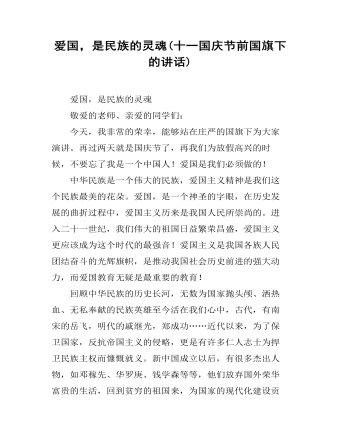
爱国,是民族的灵魂(十一国庆节前国旗下的讲话)
爱国,是民族的灵魂敬爱的老师、亲爱的同学们:今天,我非常的荣幸,能够站在庄严的国旗下为大家演讲。再过两天就是国庆节了,再我们为放假高兴的时候,不要忘了我是一个中国人!爱国是我们必须做的!中华民族是一个伟大的民族,爱国主义精神是我们这个民族最美的花朵。爱国,是一个神圣的字眼,在历史发展的曲折过程中,爱国主义历来是我国人民所崇尚的。进入二十一世纪,我们伟大的祖国日益繁荣昌盛,爱国主义更应该成为这个时代的最强音!爱国主义是我国各族人民团结奋斗的光辉旗帜,是推动我国社会历史前进的强大动力,而爱国教育无疑是最重要的教育!回顾中华民族的历史长河,无数为国家抛头颅、洒热血、无私奉献的民族英雄至今活在我们心中,古代,有南宋的岳飞,明代的戚继光,郑成功……近代以来,为了保卫国家,反抗帝国主义的侵略,更是有许多仁人志士为捍卫民族主权而慷慨就义。新中国成立以后,有很多杰出人物,如邓稼先、华罗庚、钱学森等等,他们放弃国外荣华富贵的生活,回到贫穷的祖国来,为国家的现代化建设贡献自己的力量。这些人的光辉形象和他们可歌可泣的动人事迹,永远激励着每一个中国人奋发向上!
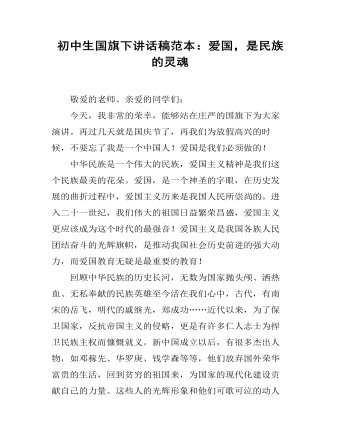
初中生国旗下讲话稿范本:爱国,是民族的灵魂
敬爱的老师、亲爱的同学们:今天,我非常的荣幸,能够站在庄严的国旗下为大家演讲。再过几天就是国庆节了,再我们为放假高兴的时候,不要忘了我是一个中国人!爱国是我们必须做的!中华民族是一个伟大的民族,爱国主义精神是我们这个民族最美的花朵。爱国,是一个神圣的字眼,在历史发展的曲折过程中,爱国主义历来是我国人民所崇尚的。进入二十一世纪,我们伟大的祖国日益繁荣昌盛,爱国主义更应该成为这个时代的最强音!爱国主义是我国各族人民团结奋斗的光辉旗帜,是推动我国社会历史前进的强大动力,而爱国教育无疑是最重要的教育!回顾中华民族的历史长河,无数为国家抛头颅、洒热血、无私奉献的民族英雄至今活在我们心中,古代,有南宋的岳飞,明代的戚继光,郑成功……近代以来,为了保卫国家,反抗帝国主义的侵略,更是有许多仁人志士为捍卫民族主权而慷慨就义。新中国成立以后,有很多杰出人物,如邓稼先、华罗庚、钱学森等等,他们放弃国外荣华富贵的生活,回到贫穷的祖国来,为国家的现代化建设贡献自己的力量。这些人的光辉形象和他们可歌可泣的动人事迹,永远激励着每一个中国人奋发向上!
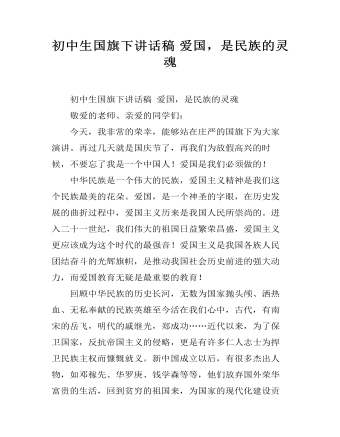
初中生国旗下讲话稿 爱国,是民族的灵魂
初中生国旗下讲话稿 爱国,是民族的灵魂敬爱的老师、亲爱的同学们:今天,我非常的荣幸,能够站在庄严的国旗下为大家演讲。再过几天就是国庆节了,再我们为放假高兴的时候,不要忘了我是一个中国人!爱国是我们必须做的!中华民族是一个伟大的民族,爱国主义精神是我们这个民族最美的花朵。爱国,是一个神圣的字眼,在历史发展的曲折过程中,爱国主义历来是我国人民所崇尚的。进入二十一世纪,我们伟大的祖国日益繁荣昌盛,爱国主义更应该成为这个时代的最强音!爱国主义是我国各族人民团结奋斗的光辉旗帜,是推动我国社会历史前进的强大动力,而爱国教育无疑是最重要的教育!回顾中华民族的历史长河,无数为国家抛头颅、洒热血、无私奉献的民族英雄至今活在我们心中,古代,有南宋的岳飞,明代的戚继光,郑成功……近代以来,为了保卫国家,反抗帝国主义的侵略,更是有许多仁人志士为捍卫民族主权而慷慨就义。新中国成立以后,有很多杰出人物,如邓稼先、华罗庚、钱学森等等,他们放弃国外荣华富贵的生活,回到贫穷的祖国来,为国家的现代化建设贡献自己的力量。这些人的光辉形象和他们可歌可泣的动人事迹,永远激励着每一个中国人奋发向上!
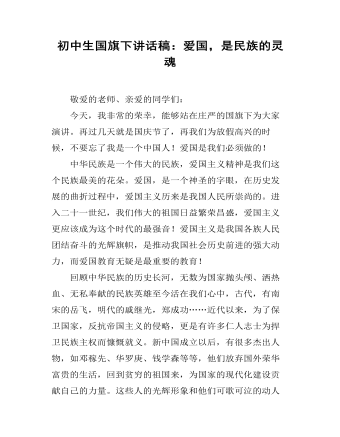
初中生国旗下讲话稿:爱国,是民族的灵魂
敬爱的老师、亲爱的同学们:今天,我非常的荣幸,能够站在庄严的国旗下为大家演讲。再过几天就是国庆节了,再我们为放假高兴的时候,不要忘了我是一个中国人!爱国是我们必须做的!中华民族是一个伟大的民族,爱国主义精神是我们这个民族最美的花朵。爱国,是一个神圣的字眼,在历史发展的曲折过程中,爱国主义历来是我国人民所崇尚的。进入二十一世纪,我们伟大的祖国日益繁荣昌盛,爱国主义更应该成为这个时代的最强音!爱国主义是我国各族人民团结奋斗的光辉旗帜,是推动我国社会历史前进的强大动力,而爱国教育无疑是最重要的教育!回顾中华民族的历史长河,无数为国家抛头颅、洒热血、无私奉献的民族英雄至今活在我们心中,古代,有南宋的岳飞,明代的戚继光,郑成功……近代以来,为了保卫国家,反抗帝国主义的侵略,更是有许多仁人志士为捍卫民族主权而慷慨就义。新中国成立以后,有很多杰出人物,如邓稼先、华罗庚、钱学森等等,他们放弃国外荣华富贵的生活,回到贫穷的祖国来,为国家的现代化建设贡献自己的力量。这些人的光辉形象和他们可歌可泣的动人事迹,永远激励着每一个中国人奋发向上!

